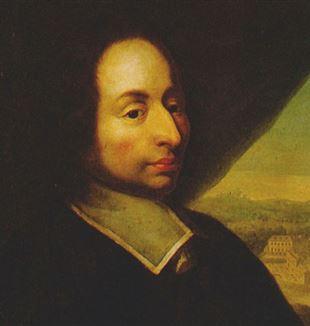
The Pope and Pascal's "awe and openness to reality"
Pope Francis' unusual Apostolic Letter for the 400th anniversary of the birth of the French philosopher and mathematician becomes an opportunity to rediscover this "tireless seeker of truth."It is not usual for a Pope to conceive and write an Apostolic Letter on the anniversary of the birth of a philosopher. This might happen more easily on the anniversary of a saint, a theologian, a religious person, a great figure in the history of the Church. This already suggests that it must be something a little out of the ordinary.
Sublimitas et miseria hominis, the letter that Pope Francis made public on June 19, the fourth centenary of the birth of Blaise Pascal, has not only this trait of exceptionality. It is written with personal involvement and impetus that, if one does not have any urgent matter to deal with, when one begins to read it they become so engrossed to the point of reading straight to the end, as happened to me as soon as I had it in my hands.
A third reason for exceptionality immediately comes across in the first lines: "From childhood, Pascal devoted his life to the pursuit of truth. By the use of reason, he sought its traces in the fields of mathematics, geometry, physics and philosophy, making remarkable discoveries and attaining great fame even at an early age. Yet he was not content with those achievements. In a century of great advances in many fields of science, accompanied by a growing spirit of philosophical and religious scepticism, Blaise Pascal proved to be a tireless seeker of truth, a ‘restless’ spirit, open to ever new and greater horizons.”
This glimpse already hints at the emphasis and beauty of the letter. As does the observation, which immediately follows, that "Pascal’s brilliant and inquisitive mind never ceased to ponder the question, ancient yet ever new, that wells up in the human heart," so well expressed in the question of Psalm 8: "What is man ever that you remember him, and the son of man that you care for him?" A few lines later Francis adds yet another reason for the attraction sparked in him by Pascal: "At the basis [of his witness and reflection] it seems to me that I can recognize an underlying attitude, which I would call 'astonished openness to reality.'"
There is enough here to invite an unhurried reading of the letter and thus to identify with Francis’ path of reason. Let me emphasize two additional reasons why it is worth taking this opportunity.
The first is the connection between reason, faith and charity. It is the axis and path to the fulfillment of Pascal's life. As a perception and overview of human existence, it is anything but obvious - especially for today's mentality. Francis' reflection traces and highlights it, gradually correlating moments in Pascal's biography to the self-awareness that gradually matured in him.
Read also - "Peace is born in the heart of each of us"
The second reason is the reference to the contribution he can offer for the reading and critical discernment of the "change of epoch" we are living. The Pope emphasizes this several times, referring especially to his first encyclical, Evangelii Gaudium. Here also lies the cultural value of the letter as well, as a solicitation and accompaniment to become more aware of today's reality and its dramas. Aware, as Guardini observed in the Foreword to The End of the Modern World, that while "in the advancing times [there seems to be] no place for Descartes, [...] Pascal [is instead] close to us, alive and lending us his help."